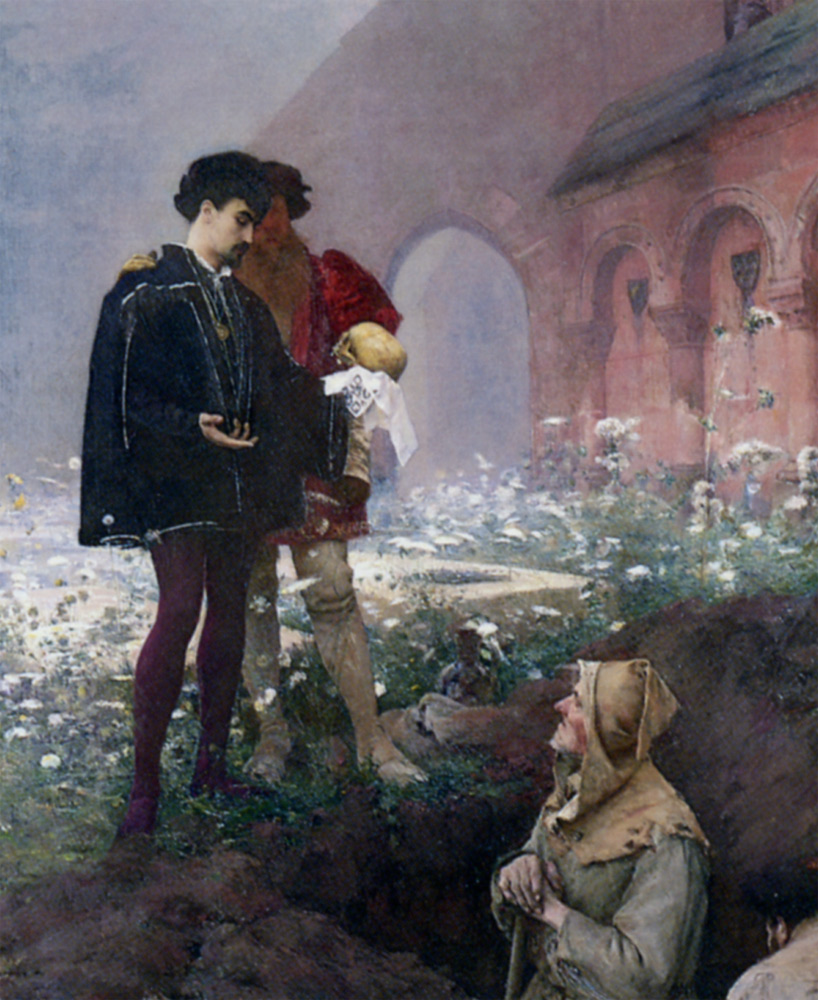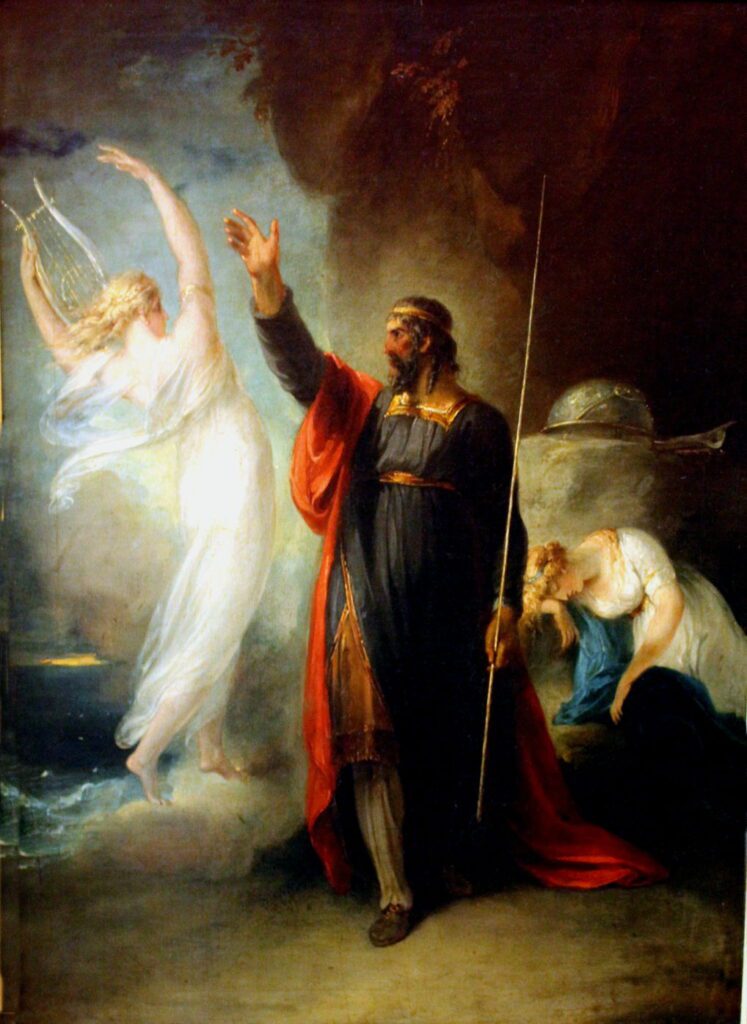Hamlet’s “To be or not to be” is such a familiar quote that it has escaped the boundaries of classrooms and theaters, and become recognizable to many who cannot even identify the play. This indicates a degree of power and relevance in any common quotation, even if it has through repetition descended to a cliche. Other parts of Hamlet’s speech have snuck into pop culture, including the Robin Williams movie What Dreams May Come and the Canadian TV series Slings and Arrows, starring Paul Gross and featuring Rachel McAdams.
Part of what makes Shakespeare interesting to me, and evidently to audiences of the hundreds of productions appearing annually around the world for the last 500 years, is that despite repetition and unfamiliar language, I continue to make discoveries that renew my enjoyment. I thought I was sick of Hamlet, and I’ll always make the case that The Tempest is a better play, but I recently had an idea about the overanalyzed speech that renewed my interest in it, and made it for me both more profound and more personally relevant.

Here is the speech, as presented by the comprehensive and reliable poetryfoundation.org:
To be, or not to be, that is the question:
Whether ’tis nobler in the mind to suffer
The slings and arrows of outrageous fortune,
Or to take arms against a sea of troubles
And by opposing end them. To die—to sleep,
No more; and by a sleep to say we end
The heart-ache and the thousand natural shocks
That flesh is heir to: ’tis a consummation
Devoutly to be wish’d. To die, to sleep;
To sleep, perchance to dream—ay, there’s the rub:
For in that sleep of death what dreams may come,
When we have shuffled off this mortal coil,
Must give us pause—there’s the respect
That makes calamity of so long life.
For who would bear the whips and scorns of time,
Th’oppressor’s wrong, the proud man’s contumely,
The pangs of dispriz’d love, the law’s delay,
The insolence of office, and the spurns
That patient merit of th’unworthy takes,
When he himself might his quietus make
With a bare bodkin? Who would fardels bear,
To grunt and sweat under a weary life,
But that the dread of something after death,
The undiscovere’d country, from whose bourn
No traveller returns, puzzles the will,
And makes us rather bear those ills we have
Than fly to others that we know not of?
Thus conscience doth make cowards of us all,
And thus the native hue of resolution
Is sicklied o’er with the pale cast of thought,
And enterprises of great pith and moment
With this regard their currents turn awry
And lose the name of action.
“And lose the name of action.” The falling cadence matches so well with the overall downward gaze of the whole. The meaning of the words so perfectly expresses Hamlet’s failure, as Laurence Olivier put it, “to make up his mind.”
“Lose the name of action” … what a great final line. Problem is, it isn’t the final line. It isn’t even a full line of pentameter. Poetryfoundation.org has gone wrong. Its slings and arrows have missed their targets. Its currents have turned awry into a sea of troubles, and it has lost the name of reliable. The real line, followed by the rest of the speech, is:
And lose the name of action. Soft you now,
The fair Ophelia? Nymph, in thy orisons
Be all my sins remember’d.
To be fair, the argument for the speech ending at “action” has this merit: Hamlet definitely changes the topic at “Soft you now” from a reflection on death to noticing a person walking around. No obvious connection appears; in fact, they are entirely different kinds of expression: one is contemplative and abstract, the other practical and factual. Before the metaphorical light bulb was turned on by an unseen hand, I would have defended the idea that the speech does end at “action.”
But a connection does exist between the two sets of lines, a connection so fundamental as to represent the moment when the play turns decisively to tragedy. If the protagonist were, say, Claudius or Gertrude, the play might already be a tragedy, since they arguably have given in to their worst selves and are headed irrevocably toward doom. But Hamlet’s trajectory is not yet tragic, precisely because he has taken no decisive action. At this point in the play, we have no incontrovertible evidence that Claudius has killed Hamlet’s father. We have only the Ghost’s word for it, and the Ghost by his own admission is speaking with an unpurified soul, which means that his motives are tainted by sinfulness. Hamlet knows this, and wants further confirmation before taking action. He wants definitive, concrete evidence. In the last three lines, Hamlet receives concrete signs, not of Claudius’s guilt or innocence, but about what action to take. When Ophelia appears before him, his immediate instinct is to call her “nymph”, a spiritual being, beautiful and grace-giving. He sees that she is “fair”, which can mean both beautiful and just, and instinctively asks for her prayers.

If Hamlet had turned to Ophelia, focusing on the person in front of him and the relationship they might have had, and placed more stock in her prayers, the play might have ended like a comedy, with a wedding rather than a slaughter. But Hamlet would rather rely on his own attempts to manipulate and control others than on the providence that, irrespective of anyone’s intent, brings Ophelia to him in this crucial moment. Instead of embracing her, he thinks he knows better. He drives her away and proceeds to kill Polonius, cause public scandal at the Mousetrap performance, mercilessly castigate his mother, and arrange the death of acquaintances, justifying himself all along the way. Worst of all, when he finally overhears Claudius’s unsolicited confession, he moves from any vestige of desire for earthly justice to a desire for Claudius’s eternal damnation. The current of the play turns awry when Hamlet chooses to reject Ophelia and her prayers.

In The Tempest, Prospero finds himself wrestling with similar demons. Like Hamlet, the treachery of trusted family has made him obsessively suspicious of others. He now trusts only himself and his power to manipulate and control. He wishes to control Ariel’s powers, force virtue of character on Caliban, Miranda, and Ferdinand, and repay every perceived treachery, even every perceived insult, with torment and pain. But as with Hamlet, in the moment of decision, a providential image of grace and revelation appears before him.
Ariel, the magical spirit whose name means “The Lion of God”, comes to him and paints a picture of the prisoners. Here are the words of the scene:
PROSPERO
Say, my spirit,
How fares the king and’s followers?
ARIEL
Confined together
In the same fashion as you gave in charge,
Just as you left them; all prisoners, sir,
In the line-grove which weather-fends your cell;
They cannot budge till your release. The king,
His brother and yours, abide all three distracted
And the remainder mourning over them,
Brimful of sorrow and dismay; but chiefly
Him that you term’d, sir, ‘The good old lord Gonzalo;’
His tears run down his beard, like winter’s drops
From eaves of reeds. Your charm so strongly works ’em
That if you now beheld them, your affections
Would become tender.
PROSPERO
Dost thou think so, spirit?
ARIEL
Mine would, sir, were I human.
PROSPERO
And mine shall.
Hast thou, which art but air, a touch, a feeling
Of their afflictions, and shall not myself,
One of their kind, that relish all as sharply,
Passion as they, be kindlier moved than thou art?
Though with their high wrongs I am struck to the quick,
Yet with my nobler reason ’gaitist my fury
Do I take part: the rarer action is
In virtue than in vengeance: they being penitent,
The sole drift of my purpose doth extend
Not a frown further. Go release them, Ariel:
My charms I’ll break, their senses I’ll restore,
And they shall be themselves.
Prospero, having suffered injustice and being now in a position of power, must choose: punish and torment the offender, or ……what? As Ophelia before Hamlet, Ariel, a spirit of grace and beauty, appears before him and shows him the answer. More than this, he shows Prospero he already knows the answer and gently, indirectly, in a way that a cranky reactionary can hear, Ariel shows him that there is a difference between the guilty (Antonio, Alonso, and Sebastian) and the innocent (Gonzalo). He points out that Prospero knows Gonzalo is not only innocent of treachery but is of virtuous character. He gently implies that punishing indiscriminately would be more than unjust: it would be inhuman. Typically such criticism would cause Prospero to explode, but the image is so potent as to overcome his inclination to rage. He chooses virtue rather than vengeance, the choice Hamlet failed to make.
One of the many things that lifts The Tempest above even the greatness of Hamlet is that, presented with a similar conflict and a similar potential resolution, the protagonist chooses good over evil, and brings healing rather than destruction into the world. Moreover, this is accomplished in an eloquent and believable way, not tied up with a neat little tinselly bow. Prospero’s turn to forgiveness does not appear fantastical or wishful thinking on Shakespeare’s part, but as the story of a real man with relatable flaws and struggles, who forgives while needing forgiveness, and turns outward to the person in front of him rather than inward to his doom.

